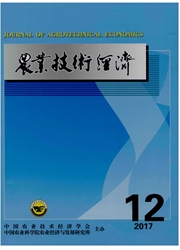

 中文摘要:
中文摘要:
在耕地质量退化问题日益严重的现实背景下。以湖北省650户农户调查问卷数据为基础,对比分析不同类型农户耕地质量保护性投入行为与偏向的差异,并运用Pmbit模型研究其影响因素。研究发现。农户进行耕地质量保护投入的比例随着兼业稷度的加深而降低:纯农户、Ⅰ兼农户与Ⅱ兼农户相应比例分别为58.99%、45.92%和44.44%。不同类型农户采取资金偏向型耕地质量保护性投入的比例均高予劳动偏向型投入。回归结槊显示,兼业分化对农户耕地质量保护性投入行为具有显著负向作用,但这种负向效应随兼业程度加深而减弱。Ⅰ兼分化与Ⅱ兼分化对农户不同偏向型耕地质量保护性投入的影响存在异质性:Ⅰ兼分化仪对资金偏向型投入具有显著的负向彩晌,而Ⅱ兼分化仅对劳动偏向型投入具有显著的负向影响。此外,户主受教育程度、村千部身份、田间有机耕路、了解过显施用化肥的危害、意识到耕地质量避化问题、具有耕地质量保护责任意识以及接受过农业技术指导都对农户的耕地质量保护性投入行为具有显著的正向影响。
 英文摘要:
英文摘要:
Under the background of increasingly serious soil degradation, using a survey dataset from 650 households in Hubei Province, this paper comparatively analyzes soil conservation input behaviors of different types of farmers and their propensity, as well as the driving factors with a Probit model. Findings are that the soil conservation input ratio decreases with an increase in off-farm working. The input ratio of pure, Type I and Type II households are 58.99% , 45.92% and 44.44% respectively. Among those different types of households, the ratio of capital-based soil conservation input tends to be higher than that of labor-based input. The regression results also show that the differentiation of households in off-farm working has a significantly negative impact on their soil conservation input behaviors, but this negative driving force weakens when farmers taking more off-farm jobs. Besides, there is heterogeneity in the influence of off-farm working on input behaviors : capital-based input behavior is negatively influenced by Type I differentiation while labor-based behavior is negatively influenced by Type II differentiation. Additionally, households' input behaviors of soil conservation are positively influenced by the following factors: education of household heads, whether they are village officials, whether there is a road for tractors leading to farmlands, the knowledge on the harm of fertilizer overuse, the awareness of soil degradation, the consciousness of soil conservation and the access to technological extension services.
 同期刊论文项目
同期刊论文项目
 同项目期刊论文
同项目期刊论文
 期刊信息
期刊信息
